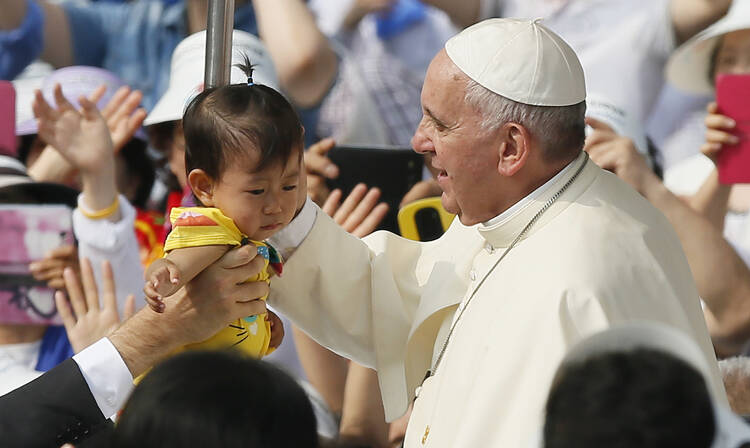In a message to participants in the 23rd Winter Olympic Games that open in PyenongChang, South Korea, on Feb. 9, Pope Francis remarked on the fact that North and South Korea “will parade together under the one flag and compete as one team.” “This makes one hope, he continued, for a world "in which conflicts are resolved peacefully through dialogue and mutual respect, as sport also teaches.”
With reference to the grave tensions and even threats of nuclear attacks that have been exchanged between the United States and North Korea, Francis said the fact that “an Olympic truce” is traditionally observed during these games “takes on special importance this year.”
Francis said the fact that 'an Olympic truce' is traditionally observed during these games 'takes on special importance this year.'
Pope Francis is well aware of the fragile and often dramatic political reality in the Korean peninsula, having visited Seoul in August 13-18, 2014, where there is a vibrant Catholic church with some 5.5 million members (just over 10 percent of the South Korean population). At the end of that visit he celebrated a nationally-televised mass in the cathedral of Myeong-dong “for the peace and reconciliation” of the Korean people, whose country has been divided along the 38th parallel since the end of World War II, and who have suffered conflict and division since the Korean War (1950-53) which ended with an armistice truce—not peace.
In his homily in 2014, the pope invited everyone to “pray for the emergence of new opportunities for dialogue, encounter, and the resolution of differences, for continued generosity in providing humanitarian assistance to those in need, and for an ever-greater recognition that all Koreans are brothers and sisters, members of one family, one people. They speak the same language.”
Since then, the pope and the Holy See have followed with growing concern the developments there, and especially the escalation of dangerous tensions between North Korea and the United States over the past twelve months. The pope’s decision to condemn “the possession” of nuclear arms as “immoral” also resulted from this dramatic situation where the terrifying prospect of their use became every day more threatening.
In today’s message, the pope extended his greeting “to the International Olympic Committee, and to the men and women athletes” from the 92 countries that participate in the PyeongChang games, and to the “authorities and the people of the Korean peninsula”—meaning the people in both North and South Korea—and said, “I accompany them all with prayer.”
Pope Francis renewed “the commitment of the Holy See to sustain ever useful initiative in favor of peace and of the encounter among peoples.”
He concluded by praying, “May these Olympics be a great festival of friendship and sport. And may God bless and protect you all.”










